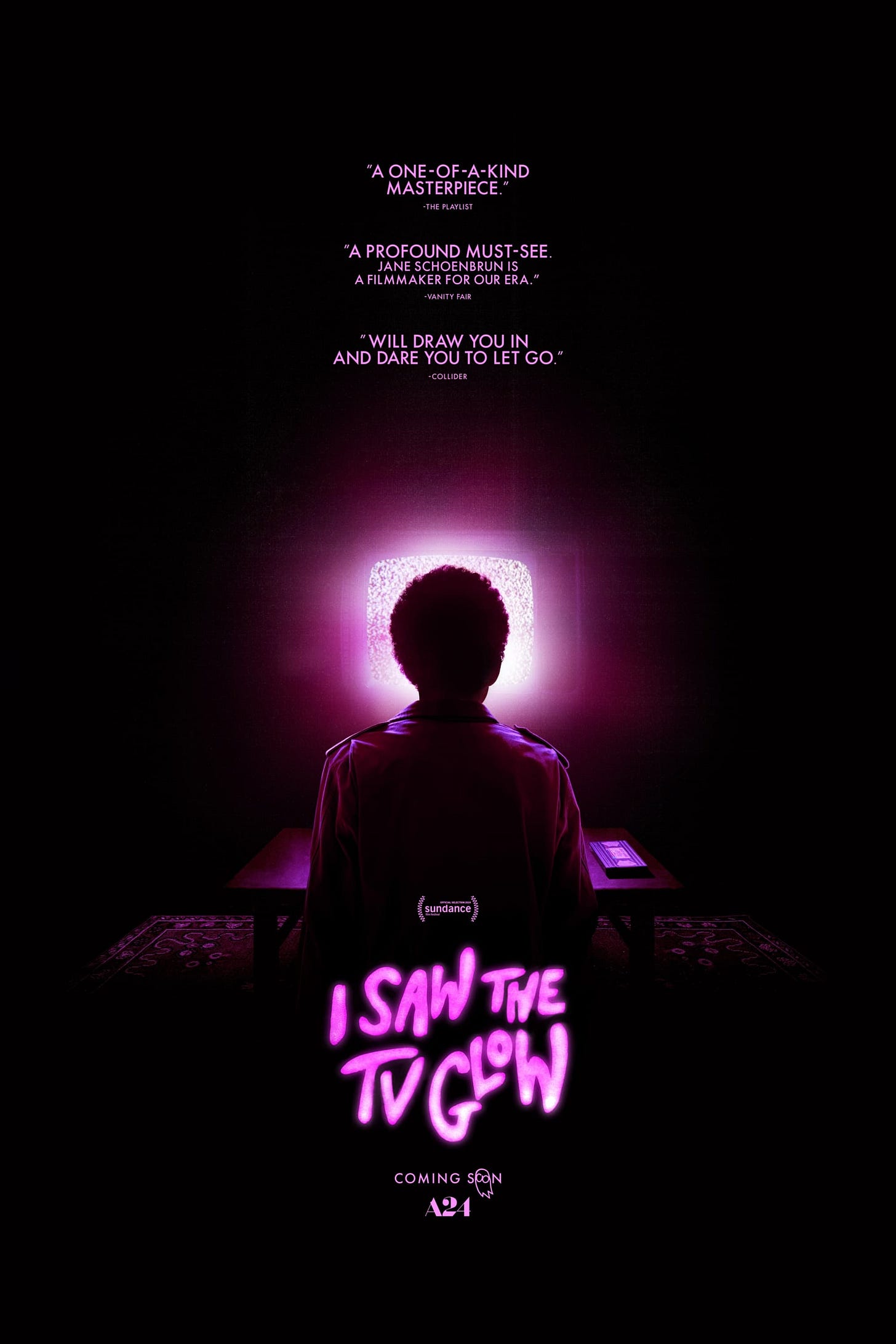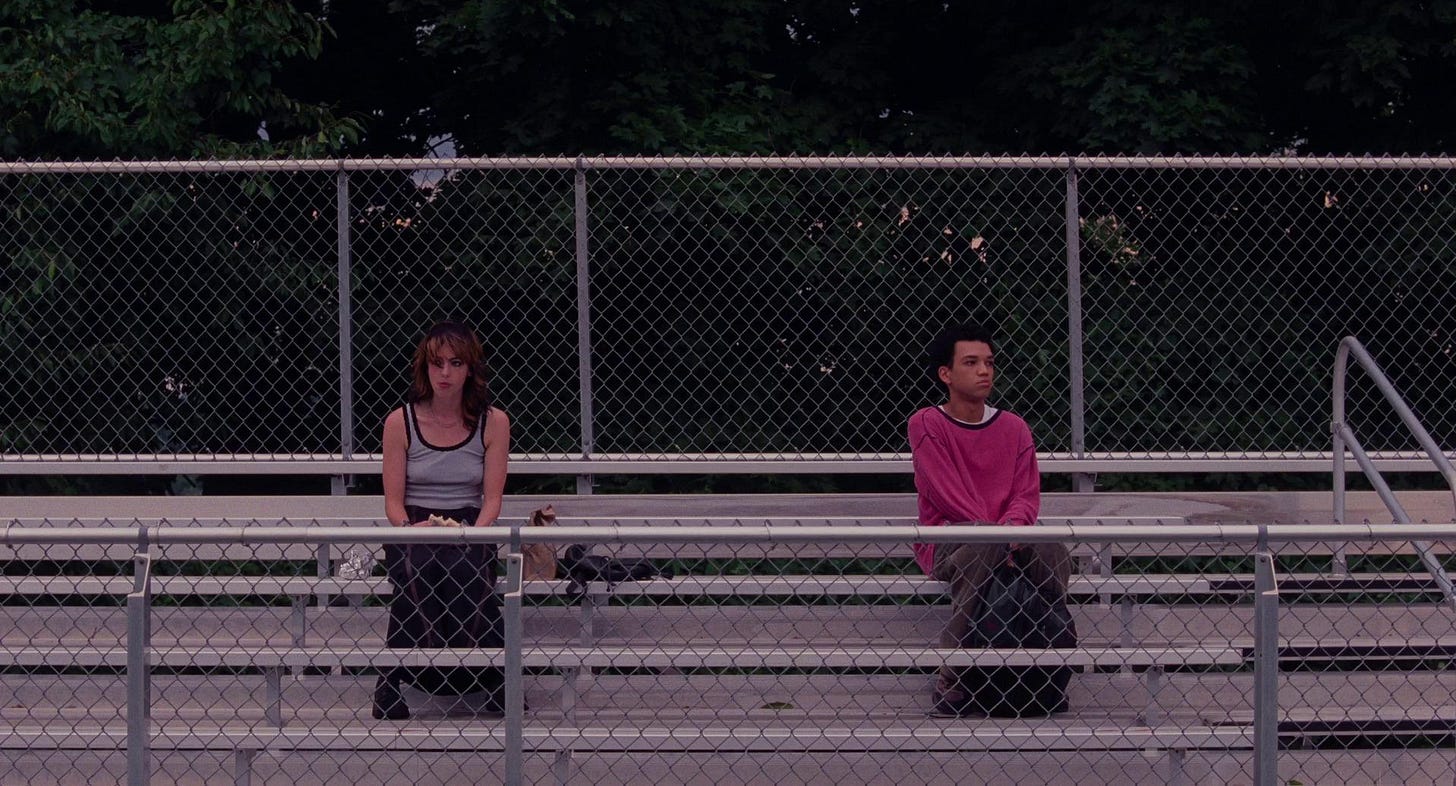Summary & Analysis: 'I Saw The TV Glow' (2024) - The Importance of Trans Representation In Media.
"What if she was right? What if I was someone else? Someone beautiful and powerful? Buried alive and suffocating to death on the other side of a television screen?"
When I first heard of I Saw The TV Glow, back in August/September of 2022, my interest was immediately piqued, with A24 and Emma Stone producing, and a trippy logline to boot: “The new film follows two teenage outcasts, played by Smith and Lundy-Paine, who bond over their shared love of a scary television show, but the boundary between TV and reality begins to blur after it is mysteriously canceled.” (Press Release). I’m very into media with simulation vibes, or reality distortion — so it sounded like something right up my alley.
But when the key art was released around January 2024, with it’s captivating neon color palette and the sinking nostalgia I felt just looking at the imagery… it immediately became one of my most anticipated films of the year. And when the trailer dropped in February, I thought, “this might change my life.” But I had no idea how true that would become.
I Saw The TV Glow finally saw its theatrical release in May of this year, and you know I ran to my AMC Stubs A-List app to book my ticket (insert: ”did you know you can see three movies a week at AMC for like $30 a month” A-List member sales pitch). I prefer to go in mostly blind when I go to see movies, so I read nothing about the film or it’s reception from it’s Premiere at Sundance. I ordered my large Hi-C Orange and my side of mozzarella sticks and took my seat. I was expecting a disturbing neon-dripped horror film with trippy nostalgic 90s-esque imagery — and I got quite a lot of that. But what I wasn’t expecting is the phenomenal portrayal of the trans-experience and the dissociation and denial that comes along with it. I mean, I didn’t even know this was a queer film in the slightest prior to seeing it. I felt like a saw an era of my life on the screen in front of me and it was both comforting and simultaneously terrifying. I found myself unable to blink during some sequences, I was no longer in a movie theater, I was entirely sucked into the screen.
It would be almost impossible to fully describe the feeling I felt while leaving the theater after my first viewing. I felt so disconnected from the world around me, while simultaneously deeply aware of my presence within my own body. And while the film definitely triggered a bout of dissociation and a bit of a personal crisis in me… I was grateful for the experience. How powerful must a film be to illicit that physical response from you?
So let’s get into my analysis. First and foremost, major major spoiler alert — I’m going to essentially be going scene-by-scene. So if you haven’t watched I Saw The TV Glow yet… I’m literally begging that you do (now streaming on HBO Max… I refuse to call it Max). But watch it before reading because I promise you, you need to experience it for yourself in it’s full glory, with as little information ahead of time as possible.
*Brief note, I’ll be using gender neutral they/them pronouns for Owen’s character, as their identity is somewhat ambiguous*
JEM Analysis - I Saw The TV Glow
Prior to jumping into my scene-by-scene analysis, I want to discuss some of the larger symbolism and my favorite aspects of this film:
Color as Symbolism:
Throughout the film, we see pinks, purples and whites — which is your first clue into the allegory behind the film. These are the colors that appear on the trans flag and the gender queer flag.
The Pink Opaque:
“The Pink Opaque is a TV show about two teenagers, Isabel and Tara, who meet at summer camp and discover they have a psychic connection. They must fight monsters sent by the evil Mr. Melancholy to trap them in the Midnight Realm,” — but I see a few symbolic meanings behind the film. Firstly, I think we as queer people often had that favorite childhood TV show that we got lost in and used as a form of escapism. That show where we saw the characters on screen and thought, “that’s who I’d like to be.” As a teenager, I remember watching RuPaul’s Drag Race in secret and having a similar experience to Owen and Maddy. In I Saw The TV Glow, Owen deeply resonates with Tara and Isabel, and this show is an outlet for their own gender identity exploration. It is a safe vessel for them to live vicariously through the characters on the screen while making no changes to their real life.
In the show, Isabel and Tara have this unbreakable bond and “psychic connection,” which to me could represent queer friendship and chosen family. Isabel and Tara bond over their shared experiences and the powers they have inside both of them. Queer people have an inherent bond through our own shared queer experiences and identity. Throughout The Pink Opaque, Isabel and Tara help each other battle Mr. Melancholy and other monsters, much like our queer family help one another battle our own real-life monsters. Maddy (as Isabel), tries to help Owen break out of The Midnight Realm and remember who they are inside. I think many of us have had a queer confidant who helped us through our coming out journey.
And finally, the cancellation of the series seems to signal the end of childhood for Owen. Overall, there is a lot of symbolism in The Pink Opaque and I’m sure I’m missing something else — but these are what stood out to me.
Mr. Melancholy:
The primary antagonist of the film (outside of Owen’s avoidance of their identity and the influences of the world serving as antagonists) is Mr. Melancholy. Mr. Melancholy’s goal, in the Psychic Plane, is to strip Tara and Isabel of their identities. To make them forget who they are and the powers they have inside of them. To send them to The Midnight Realm where they’ll live in darkness. Mr. Melancholy represents… melancholy, a feeling of reflective sadness. In literal terms, Owen and Maddy live their lives with extreme melancholia after being sent to The Midnight Realm or “earth”. But to me, this represents what happens when we refused to accept who we are. When we forget what beauty and power we have inside — shoving it deep down in an attempt to fit in with the world around us. To many queer people, we are our own Mr. Melancholy’s and to many more, our parents or other people in our lives who don’t agree with our support our queer identities and their attempts to keep us contained. But this will always create that feeling of melancholy for us.
Sound Track:
God tier.
Scene-By-Scene Analysis:
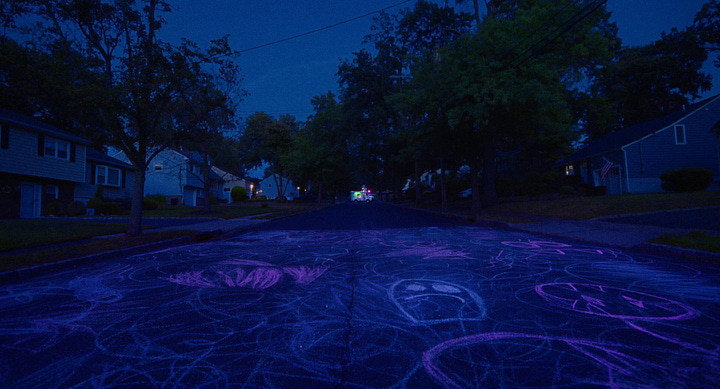
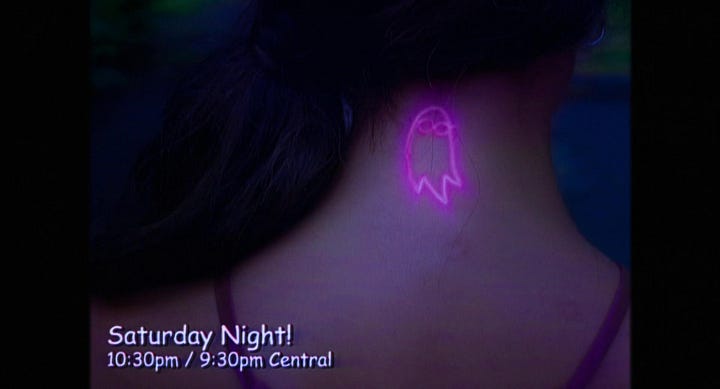
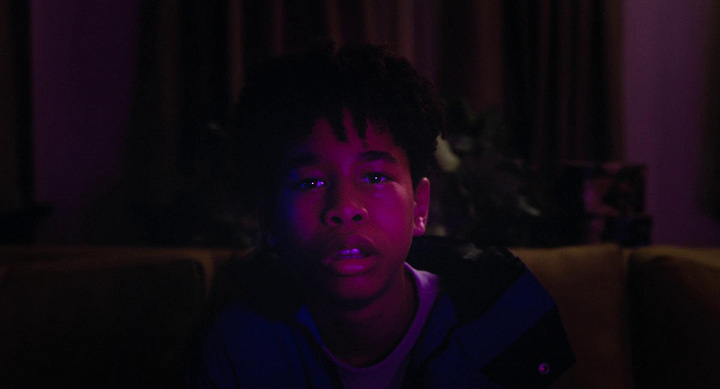
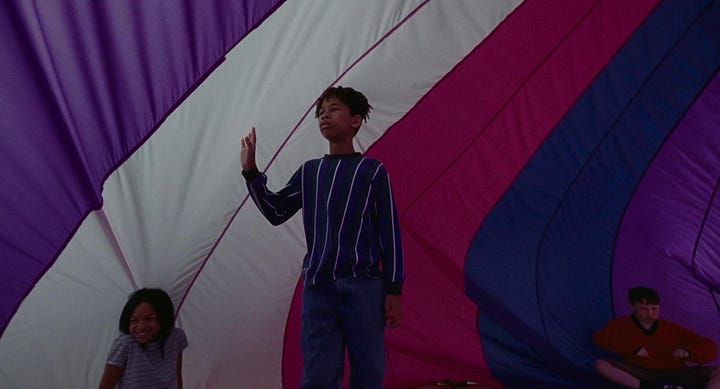
The film opens with a cacophony of old television audios, sound effects, laugh tracks, static noise and the sound of channels changing — followed by a brief but eerie zoom shot of a strange, neon-glowing ice cream truck at the end of a suburban street which is covered in pink and blue chalk art and chaotic scribbles, as the sounds of an unsettling “ice-cream-man-jingle” and the caws of distant crows fade in over it. Young Owen (Ian Foreman) is flipping through channels on the TV in their living room. A blue glow cast over Owen’s face and the room around them. The color abruptly shifts to pink as the promo for an upcoming episode of “The Pink Opaque,” begins. Owen is instantly captivated by what they see on the screen and we hear a character from the show say “They can’t hurt you if you don’t think about them,” as Anthems For A Seventeen Year-Old Girl covered by Yuele (originally release twenty years ago by Broken Social Scene) begins to play. We see flashes of color as children play under a blue, pink, purple and white parachute in gym class — very nostalgic.
This is a perfect introduction to the film and it’s themes. Owen seems disinterested in the screen while the blue hue casts over them, but as soon as the hue changes to pink and The Pink Opaque teaser starts, Owen is enamored. These colors are quite obvious in their representations and relationship to gender.
“They can’t hurt you if you don’t think about them,” is a quote about denial. That it’s easier to push our feelings down and ignore our true identities or wishes, because thinking about it and having to acknowledge it or take action because of it is painful and scary.
The use of color as symbolism continues throughout this first sequence. Owen stand under the parachute, looking at the blue pink and purple stripes of the material in thought. Almost as if they’re contemplating something.
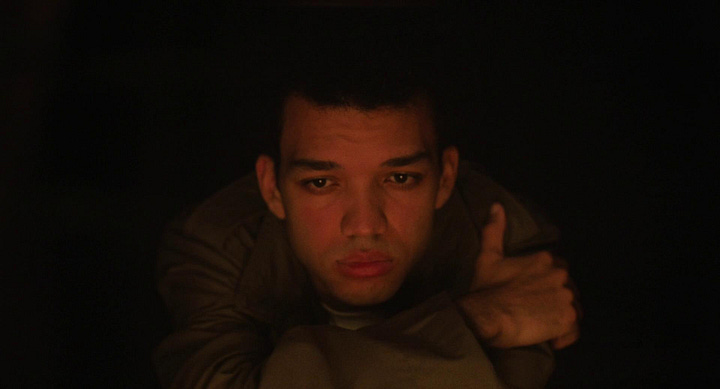
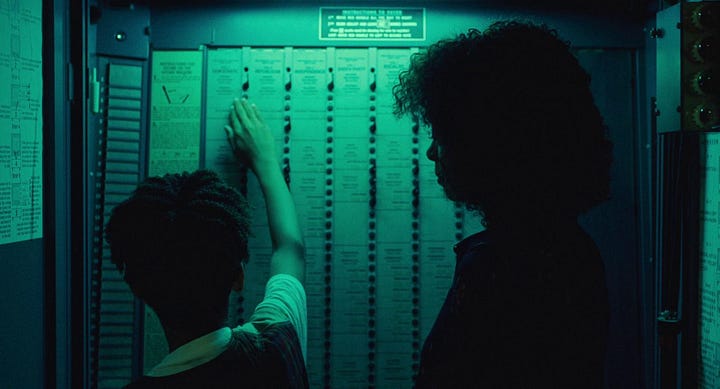
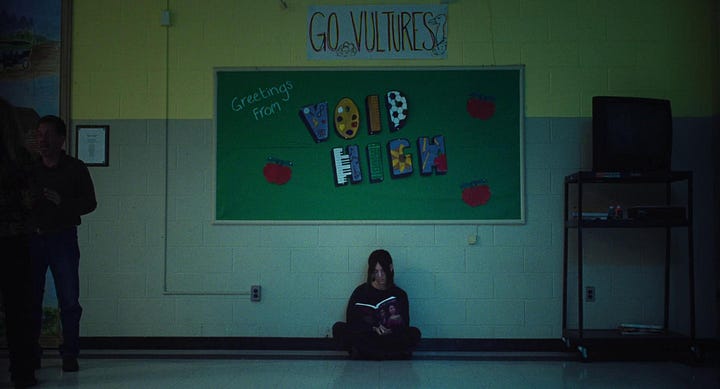
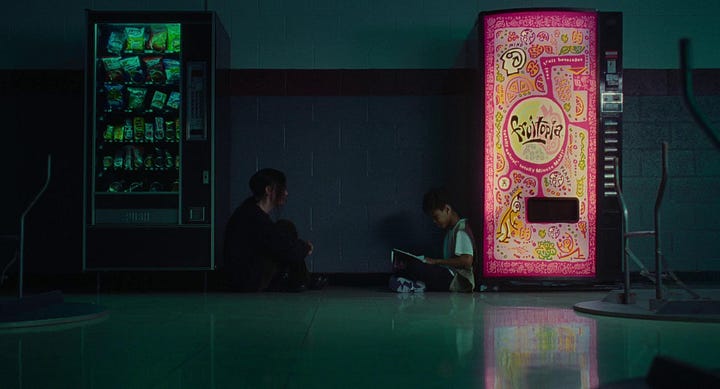
An older Owen (Justice Smith) thinks back on their childhood while looking over a fire pit. We’re taken back to 1996, when Owen meets a mysterious teenager while Owen’s mom votes at a school polling site. Maddy (Brigette Lundy-Paine) is reading an episode guide for The Pink Opaque, her favorite TV series. “Isn’t that a show for girls,” Owen asks? Maddy defends the series and asks if Owen watches. When Owen says the show premieres after their bedtime. She tells Owen that they should tell their mom they’re sleeping over at a friends house and sneak off to Maddy’s to watch.
In the imagery above, notice in the bottom left shot, Maddy is sitting under a board with the same of the high school on it: Void High… an odd name for a High School, no?


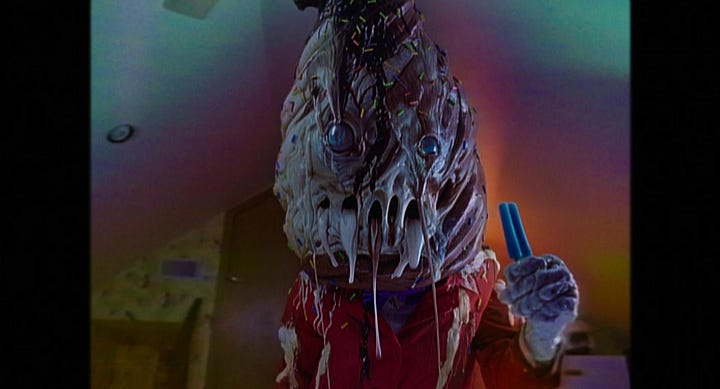
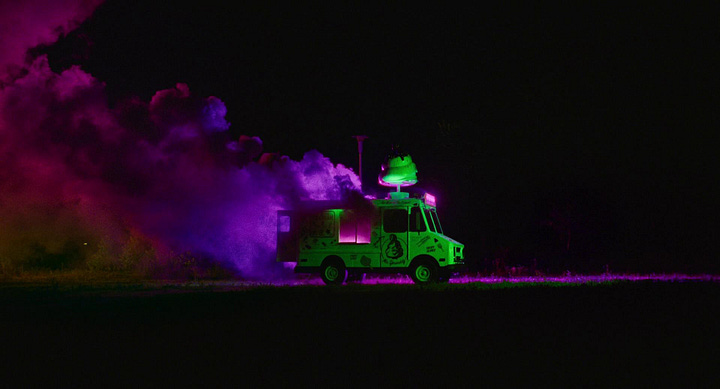
Owen’s mom drops them off at their friends house and asks if Owen brought their inhaler. When Owen’s mom pulls off, they run to Maddy’s house. After watching the episode, Maddy heads off to bed, saying “sometimes, The Pink Opaque feels more real than real life.” As a melancholic Owen walks home the next morning, we see an overlaid fading shot of Isabel from The Pink Opaque happily wandering through the woods.
Owen’s mom asking if they brought their inhaler is an important but subtle detail, which pays off towards the end of the film when we learn the relationship between Owen’s weak lungs and Tara from The Pink Opaque’s fate.
“Sometimes, The Pink Opaque feels more real than real life,” is foreshadowing for the reveals later in the film. The Pink Opaque is, in fact, more real than real life.
One thing I noticed is that the overlaid shot of Isabel wandering through the woods is not in the early-2000s stylized pixelated, hazy format of The Pink Opaque. It is in HD, just like the shot of Owen walking home. This seems to be the first hint that the relationship between Maddy and Owen, and Isabel and Tara might be deeper than just characters in their favorite show.

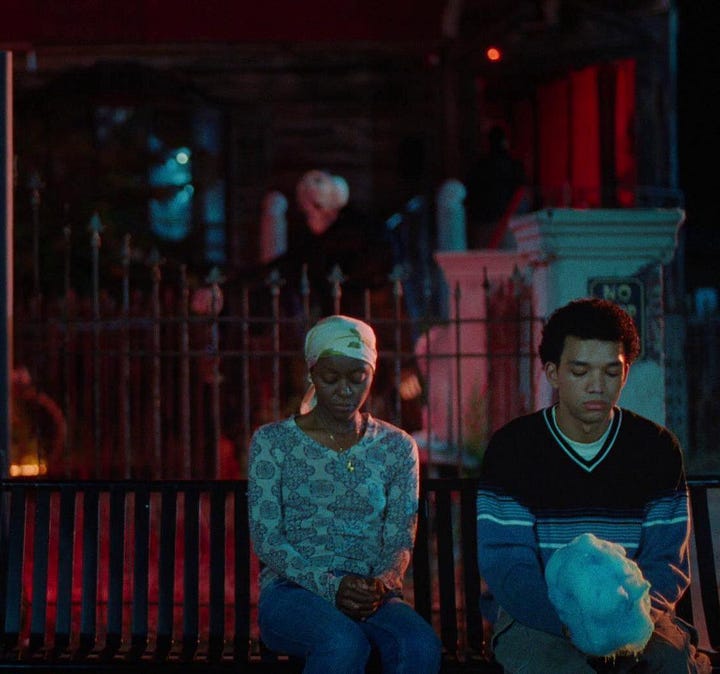


Two years later, Owen walks through a fair holding blue cotton candy, before sitting down with their mom and discussing her health issues. She tells Owen, “It just seems like you’re always somewhere else lately” as we hear electrical crackling and a flashing red light behind them. On the ride home with their mom and dad, Owen asks if they can stay up to watch The Pink Opaque, but Owen's father Frank questions them for watching a show that is "for girls,” and is told no.
I’m not sure if intentional or not, but with how carefully crafted the use of color is throughout, I couldn’t help but notice the color of the cotton candy, which usually comes in blue and pink traditionally. At the end of the fair scene with Owen’s mom, Owen spits onto the blue cotton candy and watches as the sugar crystals dissolve. As for the electrical crackling and a flashing red light behind Owen and their mom. It feels to me like a warning, or a signal. Like a call from world of The Pink Opaque to wake up and accept their true reality, as Isabella’s life is in danger.
As queer people, we’ve all had someone, or multiple people in our lives, who served as a barrier between our own acceptance. With Owen’s dad picking at Owen for watching a show “for girls,” it’s clear he is one of those people for Owen.


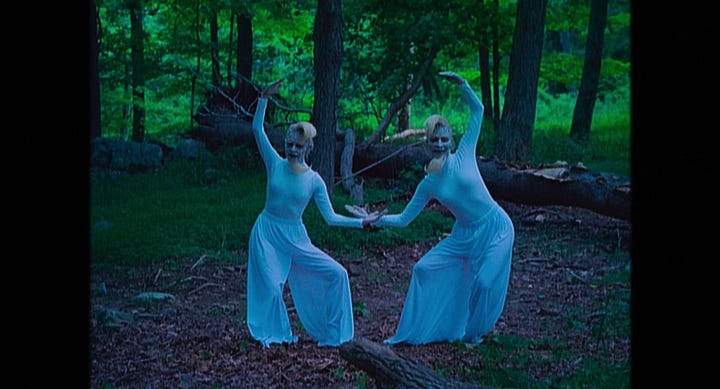
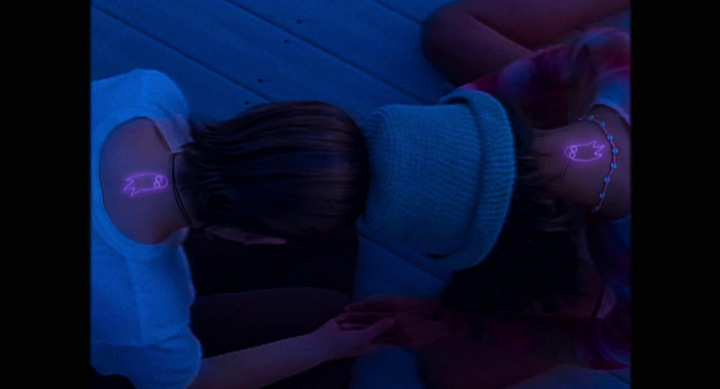
A narrating older Owen tells us that after the sleepover, they struggled to approach Maddy. But after Owen told Maddy their parents still won’t let them stay up to watch, she started leaving recordings of the last week’s episode in the school’s dark room for them. There is a scene of Owen walking through the school as Starburned and Unkissed by Caroline Polachek plays (a banger and a perfect fit, if you want to see the full sequence, click here). Owen passes through a glass corridor with blue and pink lighting gels covering the windows on either side. Owen retrieves The Pink Opaque pilot episode recording left by Maddy in the dark room and that night, Owen watches it. When one of Owen’s parents come home, they quick change the channel, left staring at black and white static on the TV set.
As Owen walks down their school hallways, we see a seemingly unimportant shot of a janitor mopping the floor. On the board to his right are the worlds, “pain is weakness leaving the body.” There is purpose and progress made through making the difficult choices.
More stunning color symbolism as Owen walks through the corridor — one side of the windows is covered by pink and purple gels, while the other is covered by blue gels. Owen walks in the middle, quite literally caught between two different identities.
I find this shot of Mr. Melancholy's henchmen, Marco and Polo, to be really interesting. They seem to be a genderqueer duo, potentially representing male and female identities, and/or the intersection of both.
Owen turning off the TV when their parents came home was so relatable. I used to lock myself away in my room, watching Ru Paul’s Drag Race on my laptop — and in the odd chance one of my parent’s came to my room to check on me, I quickly closed the tab. This is a way of hiding ourselves, denying ourselves… but also protection and self-preservation.
The next day, Owen approaches Maddy on the bleachers and offers to start coming over again so they can watch together on Saturday nights. Maddy tells them she likes girls, in case Owen had any romantic intent in hanging out. She asks Owen if they like girls. Owen says they don’t know. “Boys?” Maddy continues. Owen replies: “I think that I like TV shows,” and then:
“When I think about that stuff, it feels like someone took a shovel and dug out all of my insides. And I know there’s nothing in there, but I’m still too nervous to open myself up and check. I know there’s something wrong with me.” - Owen
This is the first obvious moment that alludes to the idea of Owen not being a cis-heterosexual. When asked if they like girls, Owen replies that they don’t know.
The above quote signals to some really difficult internal struggles within Owen, and the second half of the quote “…but I’m still too nervous to open myself up and check.” has a really insanely powerful call back in the final scenes of the film.
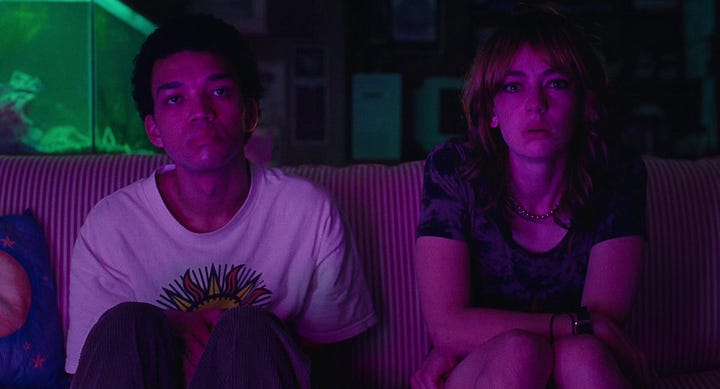
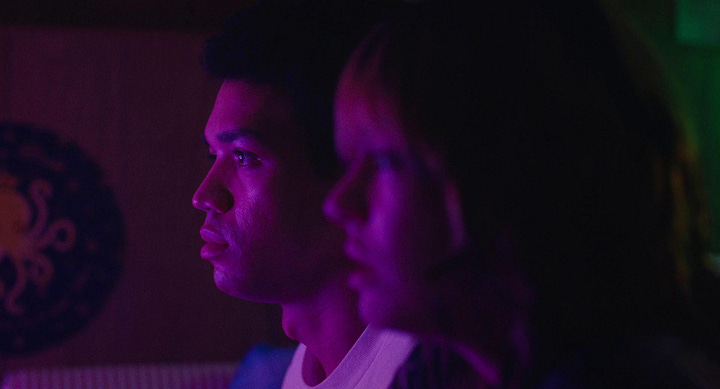

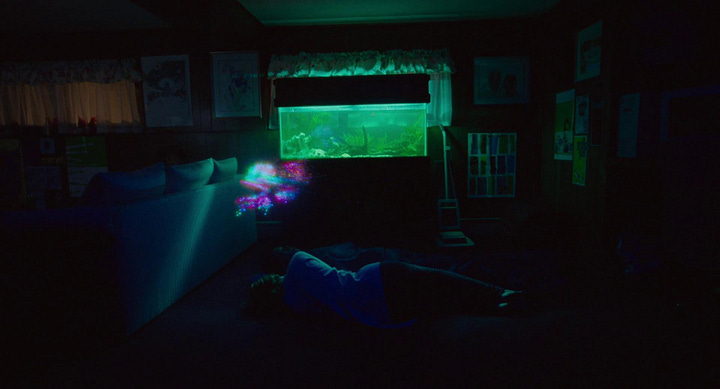
Later, they watch the newest episode together. Afterward, Maddy tells Owen she’s leaving town. “I’ll die if I stay here. I don’t know how exactly but I know it’s true.” She draws The Pink Opaque symbol on the back of Owen’s neck, where Isabel and Tara from the show have it. As Owen sleeps, a colorful static tear opens above them, like a portal starting to crack open.
The quote, “I’ll die if I stay here. I don’t know how exactly but I know it’s true.” — is quite literal, as we’ll see later on.
The drawing of The Pink Opaque symbols again suggests that Isabel and Tara might be connected to them in a deeper way than just being characters in their favorite shows. And the tear/glitch above Owen as they start to sleep feels like the line between the false reality and the world of The Pink Opaque is breaking down, or a moment of brief acceptance or gender euphoria by Owen. That, even for a brief moment, Owen is beginning to see themself for who they are.
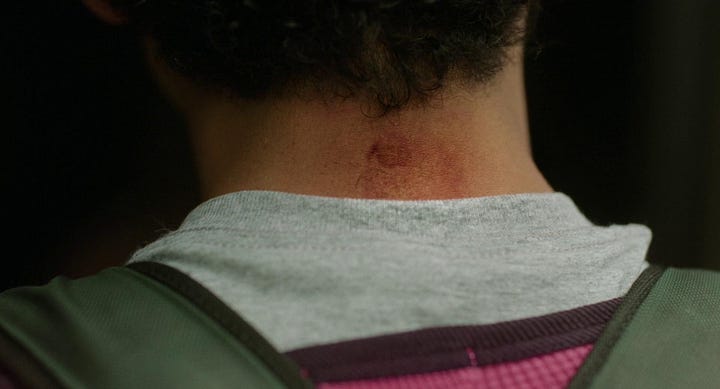

The next morning, Owen aggressively scrubs off The Pink Opaque symbol drawn on the back of their neck in the bathroom. Maddy asks Owen to pack an overnight bag and run away with her the next weekend. After leaving Maddy’s house, Owen runs to their old ‘friends’ house, the one they’ve been lying about spending the night at, and begs the friend’s mom (played by Amber Benson from Buffy The Vampire Slayer Fame — which is not a coincidence as she played Tara in Buffy, a queer character who was killed off) to tell Owen’s parent’s they’ve been lying about spending the night. They want to be grounded so they can’t leave with Maddy.
Owen scrubs their neck raw in order to remove the Pink Opaque symbol, likely so their parent’s don’t see. This is another attempt at Owen trying to hide and deny themself, but the remnants of the symbol is left behind. You cannot scrub away your identity.
Owen gets themself grounded because they aren’t ready to leave the safety of their false persona behind or accept themself.
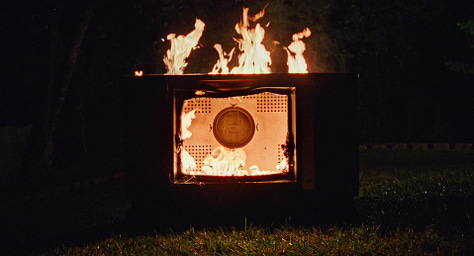

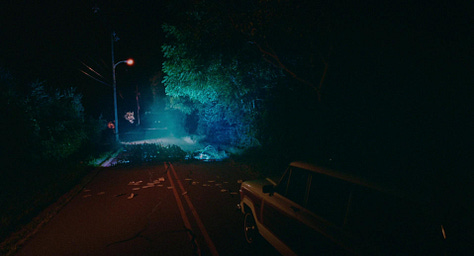
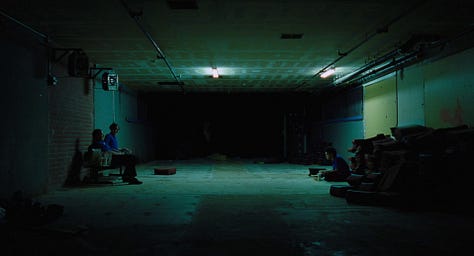

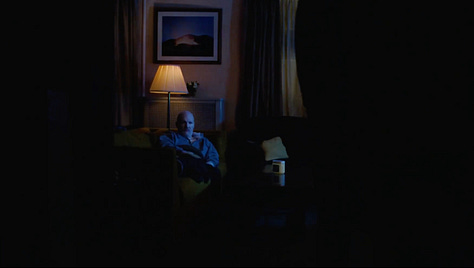
A few weeks later, Maddy disappears without a trace, leaving behind only her TV set burning in the backyard. Shortly after… The Pink Opaque is cancelled. Eight years later, Owen is working in a movie theater with two douchey male coworkers. Owen even walks in on their manager receiving oral from a female colleague, before having a degrading conversation over lunch in a backroom of the theater. On their way home, a downed power line blocks the road home. Electricity crackles and pages flutter across the street. Owen picks up a page. It’s from The Pink Opaque’s episode guide for Season Six, Episode 1: Escape From The Midnight Realm. At home, Owen apologizes for being late and explains the downed power line to their dad who is on the living room couch watching a sitcom. We see a distant shot of Owen’s dad on the couch, but his face seems potentially distorted and definitely creepy — covered with flashes of blue from the TV set. Owen’s dad says nothing, just stares at them.
For some, the time jumps might feel abrupt. But I feel this was intentional on Jane, the director’s part. Time was meant to move quickly and jump several years into the future in just seconds, as it is revealed that seconds on The Psychic Plane go by like years in The Midnight Realm. This also leans into feeling of letting life pass you by. You blink and it’s been years.
Those douche-bag coworkers represent toxic masculinity to me. Owen feels so different from them, and struggles to relate with them, because he is not like them. And Owen can sense it.
The power line in the street, literally blocking Owen from their routine life seems to act as a second warning or signal intended for them. Encouragement to connect the dots. The episode guide page that Owen picks up is for Season Six, Episode 1: Escape From The Midnight Realm… but the show was cancelled after the fifth season. Season Six does not exist (yet).
The shot of Owen’s dads’ face was disturbing. It seemed subtly evil and distorted, like a villain from The Pink Opaque. Owen’s dad has been a barrier to Owen’s self-acceptance, and I think this reflects that. While Owen’s dad may not be evil, he is a villain of sorts in Owen’s story.
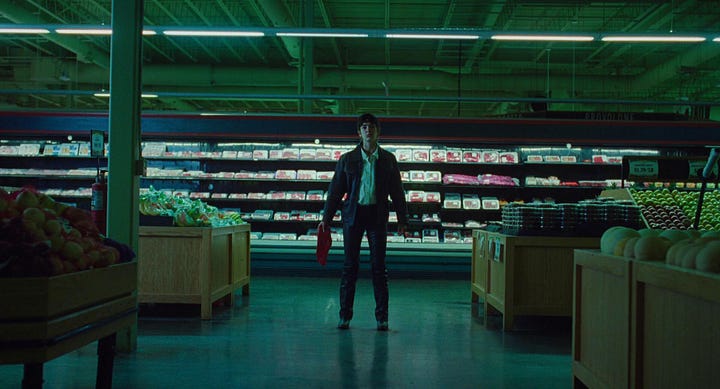
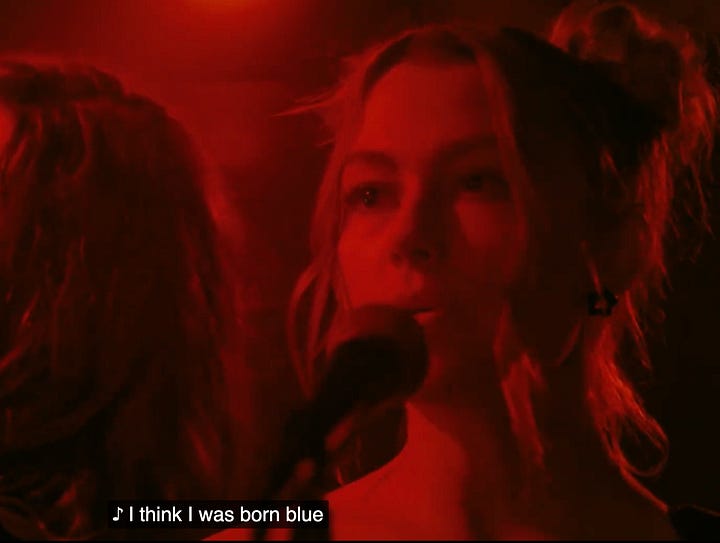

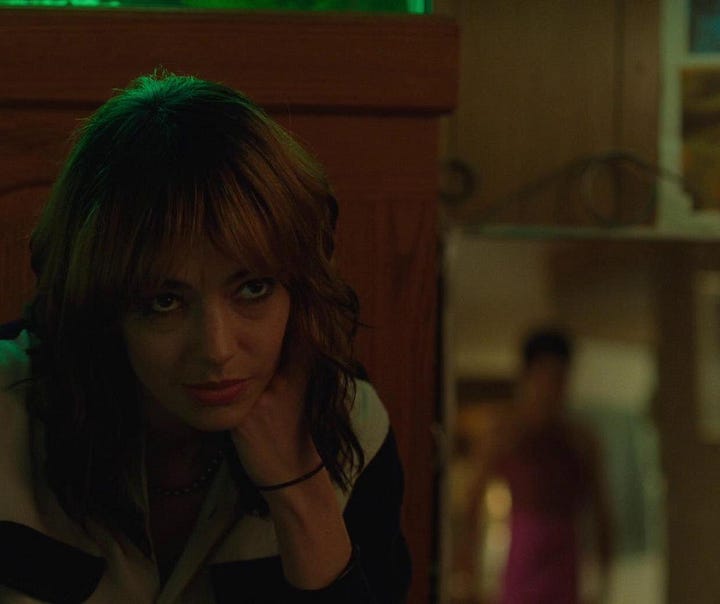
At an empty grocery store, Owen turns to see a figure. She asks if Owen remembers her. It’s Maddy, but with much shorter hair. She tells Owen she knows a place on the edge of town where they can talk. At a dive bar, a singer performs a song about childhood and melancholia. “I think I was born bored, I think I was born blue, I think I was born wanting more…” Maddy asks Owen if they remember The Pink Opaque. Owen does of course, it’s their favorite show of all time. Maddy asks if, when Owen thinks back, do they remember it as just a TV show? We see a shot from Maddy’s basement, with the bathroom door cracked open just enough to see the back of Owen wearing a dress. It quickly cuts back to the present, where Owen assures Maddy they remember it as a TV show. She asks Owen if they’re sure that’s all it was. And now we see Owen leaving the bathroom wearing a pink dress while they softly smile at each other.
In the grocery store, Maddy’s appearance with the shorter hair resembles that of Tara from The Pink Opaque. The barrier between realities is closing in, and Maddy has been transformed back into Tara after accepting her true identity.
Random note, when the song was playing… I said to myself: “this sounds like a song Phoebe Bridgers would write. CUT TO: Phoebe mother-fucking Bridgers on stage performing the song. Anyway, the song was very relevant to the themes of the film. Dissociation from / denial of reality, and overall childhood melancholia.
When thinking back on The Pink Opaque, Maddy asks Owen if they’re sure a TV show was all it was? We finally see physical parallels between Tara and Owen, with the shots of Owen in a dress. It’s most obvious now that there is a gender identity struggle happening inside of Owen. In the literal sense, Maddy is telling Owen The Pink Opaque was lived experience, reality. In the analogical sense. It seems like Maddy helped Owen experiment with their gender expression, but Owen has buried the memories of those nights in her basement deep inside of themself.
As static crackles, Maddy monologues:
“Do you ever get confused? Like maybe the memory isn’t quite right? Like does time ever feel like it’s not moving normally? Like it’s all out of wack. Do you ever feel like you’re narrating your own life, watching it play in front of you like an episode of television. Or do you ever have a hard time distinguishing between what happened in the show and what happened in real life? Like somehow the memories got jumbled around. Shook up like a snow globe. I’m trying to go slow, so I don’t alarm you.”
This monologue fucked. me. up. Rarely has media described what dissociation feels like better than this. I struggle almost daily with dissociation. With losing time. Blinking and months have gone by since I’ve felt present in reality or present in my body. I’ve often described dissociation to friends as, “feeling like you’re watching a tv show from the POV of behind your own eyes, like VR goggles. But what you’re seeing doesn’t feel like something that belongs to you, but rather, belonging to someone else entirely.” I especially feel this way when thinking back to my childhood, because I separated myself into two different people. The person I played because I needed to survive, and me, my actual self who I spent time with in my mind, and who started to materialize when around friends. Most of those memories don’t feel like they belong to me, because someone else lived through them, not the me who is typing this. So I related to this on such a painfully spiritual level.
The snow globe mention specifically is once again foreshadowing to a reveal, with Mr. Melancholy shaking a snow globe to reveal Owen inside.

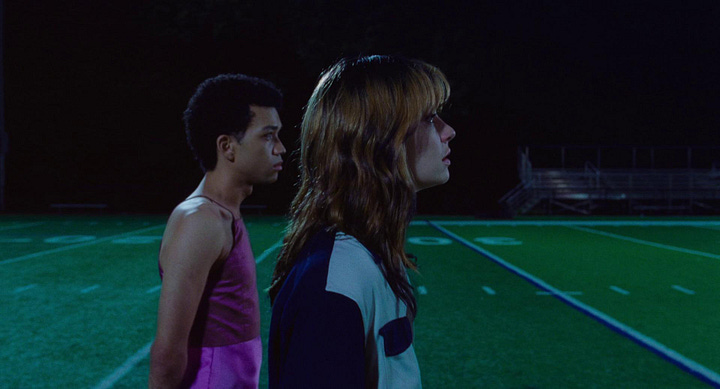
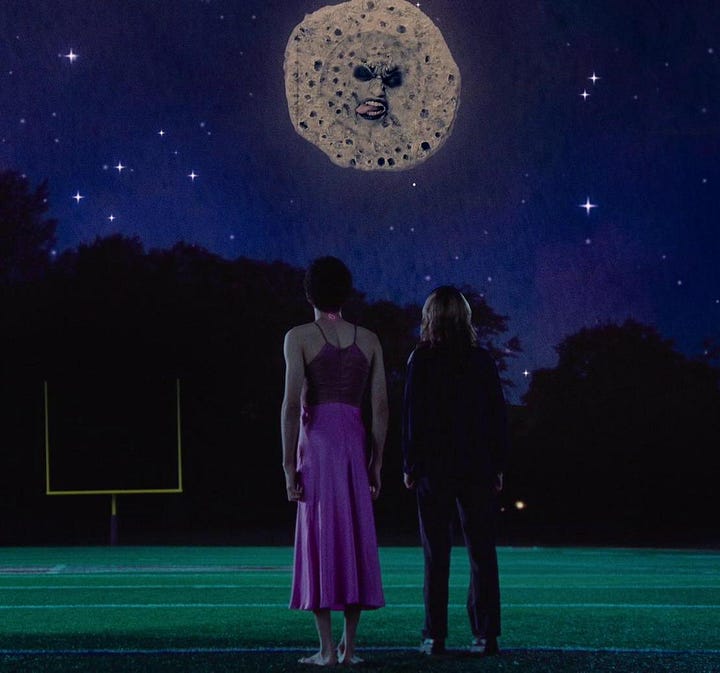
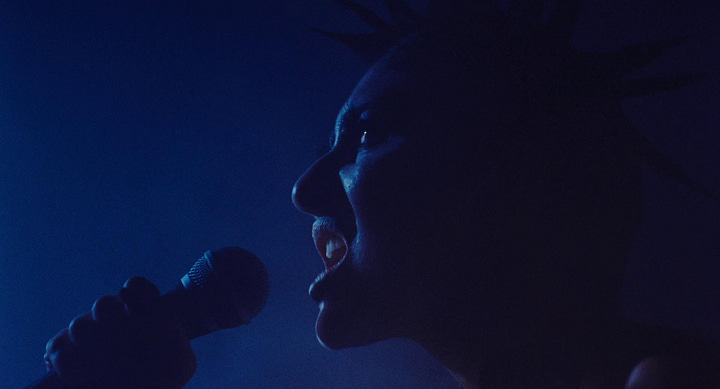
We see intercut shots of Tara in a pink dress walking on a football field, then Owen and Maddy on the same football field and in the same dress outfits. Owen, overwhelmed, leaves the dive bar. Maddy tells them she’s going back to The Psychic Plane. She asks if Owen remembers how the show ended, warning Owen that they can’t trust anyone. That everyone in Owen’s life are working for the antagonist of The Pink Opaque, Mr. Melancholy. She tells them she’ll be at the high school the following night and hopes they’ll come.
More symbolism clearly suggesting that Owen and Isabel, and Maddy and Tara are the same people.
Maddy telling Owen they can’t trust anyone, that they're working for Mr. Melancholy is interesting. There’s again, the literal sense for the storyline. But for the analogy, it’s true. There are people in our life who will try to convince us we’re someone that we’re not. They want to hold us down and keep us within a box, to keep us living as somebody they can understand.




That evening, Owen re-watches the series finale. In the show, as Isabel and Tara attempt to meet up at their old sleep-away camp to fight Mr. Melancholy, Isabel picks up on a psychic signal from Tara pleading for help…Mr. Melancholy had gotten to her first. They suddenly capture Isabel, cut out her heart and feed her Luna Juice — which poisons her and makes her forget who she is. Mr. Melancholy appears with a snow globe. “You’re gonna love the midnight realm, it’s such a wonderful, wonderful prison.” The inside of the snow globe depicts the opening scenes of the film, with Owen watching the trailer for The Pink Opaque and confused under the gym-class parachute. “Soon you won’t remember anything. Your real name. Your super powers. Your heart. You won’t even remember that you’re dying.” They bury Isabel alive, and the show ends. Seemingly forever.
This is when we finally understood what happened. Isabel (Owen) and Tara (Maddy) were captured by Mr. Melancholy, and given a poison that causes them to forget who they are. He rips their hearts out, and buries them alive — sending them to ‘The Midnight Realm’ which is where Owen and Maddy exist throughout the film.
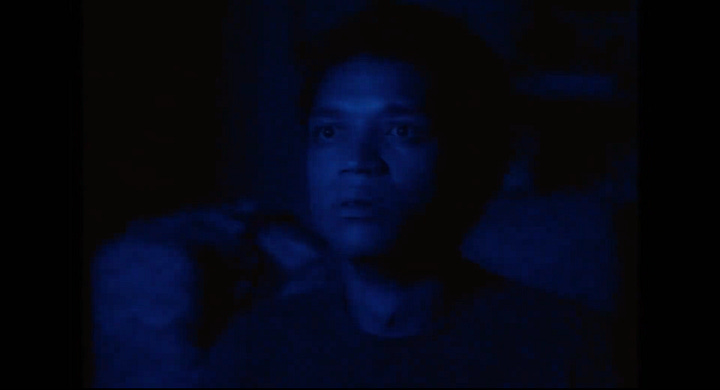
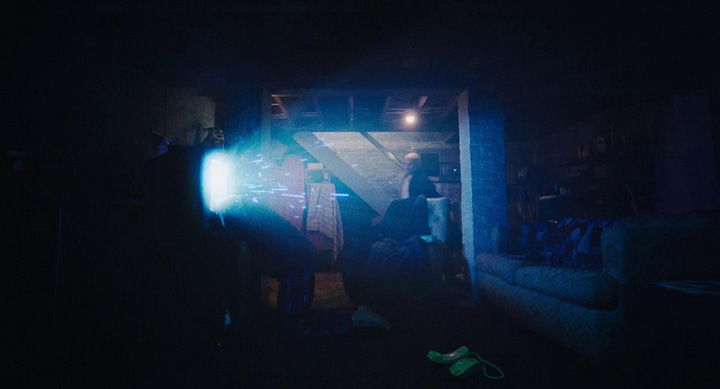
The footage of Owen becomes static and blurred, like the style of the scenes from The Pink Opaque. Like an old-TV show from the 90s. Owen is gasping for air after finishing the finale. Their father hears banging from the basement and finds Owen with their head in a sparking tv screen, flashing colors as Owen tries to crawl through. Owen’s dad drags them to the shower to calm them down while Owen screams “this isn’t my home, you’re not my father” before they throw up a neon, static liquid.
The shot of Owen watching the finale, edited to look like a scene from the Pink Opaque was stellar. It removes the mask… The Pink Opaque is the reality, not the one Owen is living in now.
Owen is gasping for air because their true self, Isabel, is currently buried alive in the Psychic Realm. We’ve actually known of Owen’s breathing issues since the start, when Owen’s mom asks if they remembered their inhaler while dropping them off. This indicates that Maddy was right. That Owen has been dying in The Psychic realm, buried and struggling to breathe. The gasping and breathing issues also resembles the feeling of panic attacks to me, something many queer people struggle with.
The scene of Owen with their head in the TV, trying to desperately crawl through the screen has stuck with me since the moment I saw it. Owen, for a brief moment, accepts the truth and wants to escape their current reality. To be who they truly are. But their dad, a continuous barrier for Owen, is the one who stops them and physically restrains Owen from doing so. Owen throws up that neon static liquid as who they are inside seems to try to break out.
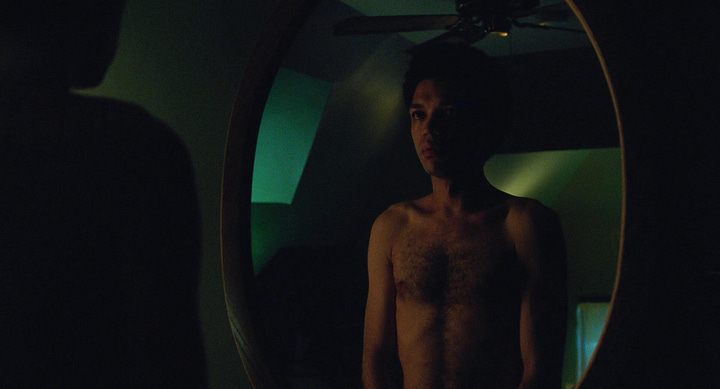
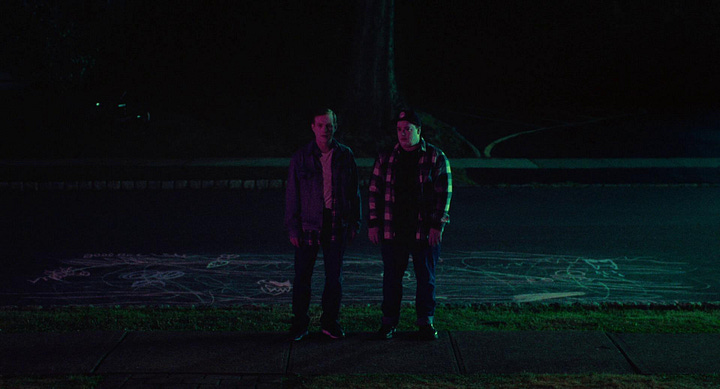

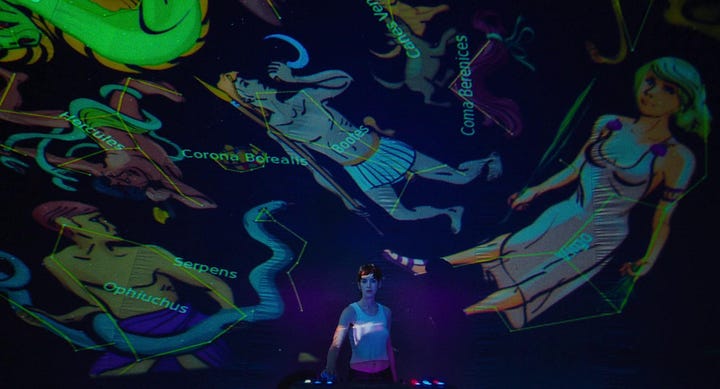
Owen stands in a mirror, looking at themself. But quickly throws a shirt over their unshaved chest. They open the front door and find two uncanny-valley looking ass men, but seem to just shake them off. Owen heads to the school, where Maddy has set up a makeshift planetarium in the school gymnasium. Maddy begins to recount what happened to her after she skipped town.
This shot of Owen in the mirror felt like a clear moment of body dysmorphia. As someone who struggles to recognize the person they see in the mirror at times. I felt deeply connected to this brief shot.
The shot of the two men seemed to be a reference to Marco and Polo, Mr. Melancholy’s henchmen…
The makeshift planetarium, specifically set up inside of the school gymnasium heavily resembles the parachute game from Owen’s childhood seen throughout the film. On the outside of the inflatable planetarium, there is an air pump of sorts, which expands and contracts — hissing like a ventilator (which could potentially reference back to Tara and Owen’s breathing issues).
“I’d got out of that town… that place I knew would kill me if I stayed. But something was still wrong. Wronger even. Time wasn’t right. It was moving too fast. And then I was nineteen, and then I was twenty. I felt like one of those dolls asleep in the supermarket. Stuffed. And then I was twenty-one, like chapters skipped over on a DVD. I told myself, this isn’t normal. This isn’t normal. This isn’t how life is supposed to feel. I thought about running away again. About moving to Santa Fe and changing my name one more time. But I knew everywhere would be just the same.”
Yet another Maddy monologue hitting me like a bag of bricks. Sometimes, as queer people, we think escaping our physical reality will change how we feel inside. We put as much distance as we can between ourselves and the place we grew up in an attempt to run away and hide from it. But it doesn’t change how we feel. Because what’s broken is inside of us. A change of scenery won’t change how feel feel.
And another mention of this distorted passage of time. I feel exactly the way Maddy felt. Like you blink and another year has passed and you’re still not happy with who you are, you still don’t feel like yourself. You dissociate through it and suddenly you’re twenty-five.
Maddy paid a burnout kid fifty dollars to bury her alive. She screamed for help and tried to claw her way out, but the dirt was packed too tight.
“I felt myself start to leave myself, and it was like I was watching myself on TV from across the room. And I was moving further and further away from the screen, until the screen was so small I couldn’t even see myself anymore. And then I was clawing my way up out of the ground. And then I was at the surface, gasping for air. Rain pouring down on me. Thunder and lightening. And I was finally back there. Back at our old sleep away camp. Just like I was waking up from a bad dream. That whole life, that whole reality where I was Maddy Wilson… drifted away, like a brief hallucination. But after a few moments I could hardly even remember. And all those memories that had felt so real, washed away with the rain back at our old sleep away camp. And I was me. I was finally me again…”
The symbolism behind Maddy burying herself as a way of reconnecting with her true identity of Tara is compelling. As queer people, especially trans people — we have to… effectively kill off the old version of ourselves in order to bring our true selves into reality. Death as rebirth.
Maddy told Owen she tried to look for them (Isabel), but she couldn’t. She found the Luna Juice used to send them to The Midnight Realm, and came back to save Owen.

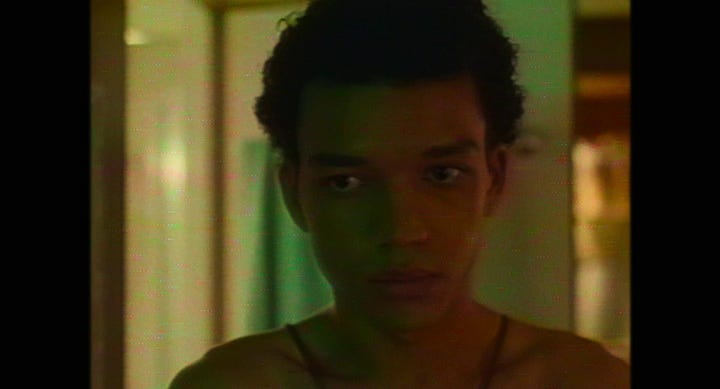

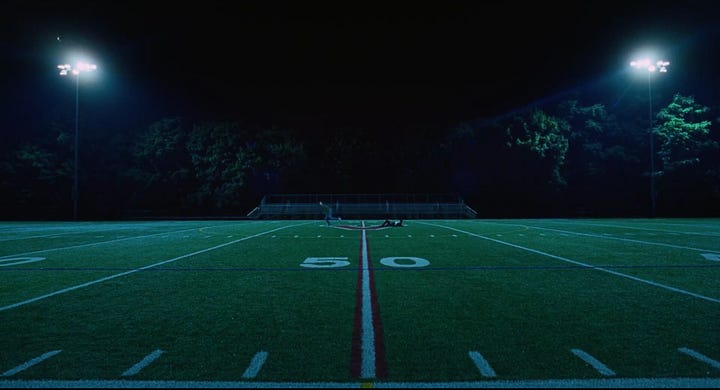
But Owen is still in denial, they don’t believe Maddy’s story… or they don’t want to believe her story. Nonetheless, they follow Maddy to the football field, where she’s dug a hole. We see shots of Owen in the dress in Maddy’s basement, in that same pixelated haze. On the field, as they approach the hole, Owen says “It’s like the Drain Lords (from The Pink Opaque), it’s not real if I don’t think about it.” Maddy calls Owen Isabel and holds their hand. Owen pushes her to the ground and runs away.
Tara came back as Maddy to try to save Isabel as Owen. But Owen, calling back to the first quote from the show in the intro, believes “it’s not real if I don’t think about it.” Owen is still in denial and believes they can stuff themselves down deep inside. That it’s easier this way.




As narrator, Owen tells us they never saw her again — but recounts the lasting impression of that night on them over the year that followed. If you want to watch this scene (gut-wrenching), you can see it here!
“I told myself I made the right choice, Maddy’s story was insane. It couldn’t be true. But some nights when I was working late at the movie theater, I found myself wondering… what if she was right? What if she had been telling the truth? What if I really was someone else? Someone beautiful and powerful […] But I know thats not true, that’s just fantasy. Kid’s stuff.”
For years of their life after, Owen still contemplated their identity. No matter how hard they tried to push it away, it never remained buried inside. Because it never will.
Owen walks home in a street covered in sidewalk chalk. There is imagery from The Pink Opaque written on the pavement, and in large letters “there is still time.”
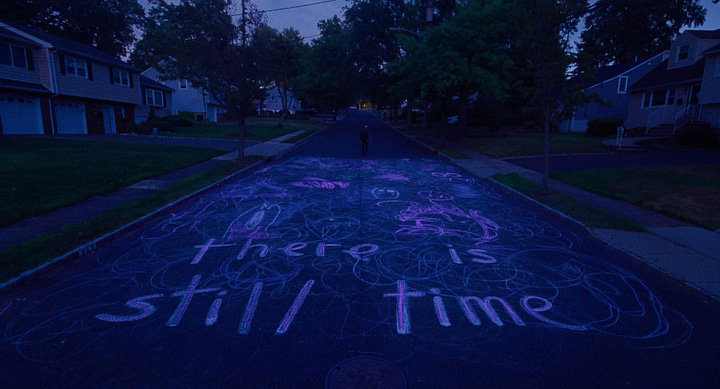



Owen tells us the that the theater closed eventually, but their manager brought Owen with them to work at the Fun Center, where they work now restocking the ball pit. Owen tell us their father passed away in 2010. “Time moves fast these days. Years pass like seconds. I just try not to think too hard about it”
In the literal sense, Maddy said that minutes in the Psychic Plane feel like years in the Midnight Realm, which is why time is passing so strangely for Owen. Isabel (Owen) is dying in the midnight realm. So as time passes quickly, Owen’s health is deteriorating. But in the analogical sense, Owen is continuing the suppress themself and disconnect or dissociate from reality. This can cause intense loss of time and memory.
Narrator Owen, who’s been sitting at the fire, stands up… and douses the pit with water, extinguishing the flames. Owen stays in the house they grew up, saying “it was time for me to become a man", and even started a family of their own, who Owen says they love more than anything. Owen is visibility getting older. Struggling to carry their old TV set to the street and drag in a new flat screen. One night, Owen decides to rewatch The Pink Opaque, which is on streaming now. While they watch, it’s nothing like they remembered. “The whole thing felt dated and cheap […] I just felt embarrassed.” And we hear Owens labored breaths as their face flickers between blue light and darkness.
Owen’s extinguishing of the fire marks the start of their spiral into physical and spiritual annihilation. Like the fight is over, this time forever.
There’s nothing like re-watching a favorite childhood tv show just to realize how cheap and cringey it was with adult eyes. But in the literal sense, the show looks completely different, because it’s not the same show they watched as a kid. Because they didn’t watch The Pink Opaque as a kid, they lived it.
Owens breath is labored as Isabel continues to suffocate in The Psychic Realm.




Twenty years later, Owen is still working at the fun center. We see games clearly inspired by The Pink Opaque: “Marco & Polo” the twin henchmen of Mr. Melancholy, “Mr. Melancholy’s Midnight Dash” with the slogan “The Race for Your Life.” Owen is old and drained. A young boy plays in a cash grab machine, as the words “You Are Dying” briefly shown in pixelated text on the display above.
There was a lot of very clear visual symbolism in this scene. It was a final wakeup call or warning from The Psychic Plane to wake up.

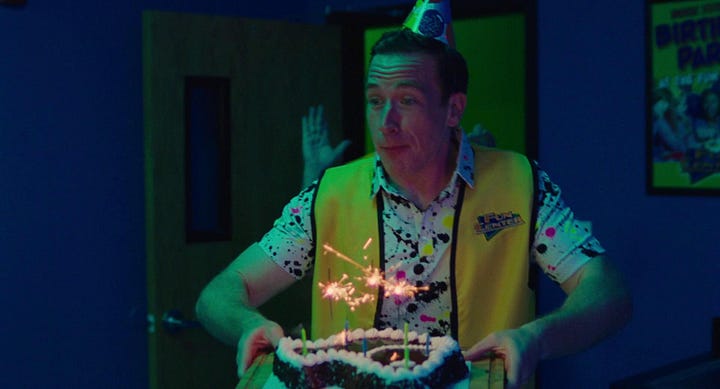


Owen hits their inhaler, clearly struggling to breathe. They sing happy birthday to a young boy holding a party at the Fun Center, but when they repeat the song, faster, Owen begins to scream in a panic. While everyone else is frozen around them. Lights flash neon colors as Owen screams, “You need to help me! I’m dying right now.” Owen, gasping for air, apologizes and drags himself across the floor, screaming for his “Mommy” (I was sobbing, oops). If you want to watch the birthday scene, you can view it here — but be prepared for Mr. Melancholy to rip your heart out.
Noticeably, Owen’s manager looks the same as he did twenty years earlier at the theater. Only Owen is aged and in ill-health. It’s clear this is not a true reality.
When Owen is screaming for help, everyone around them are frozen, silent. For many of us, we’ve issued this same cry for help, only for it to go unheard. Ignored by the world and those around us.
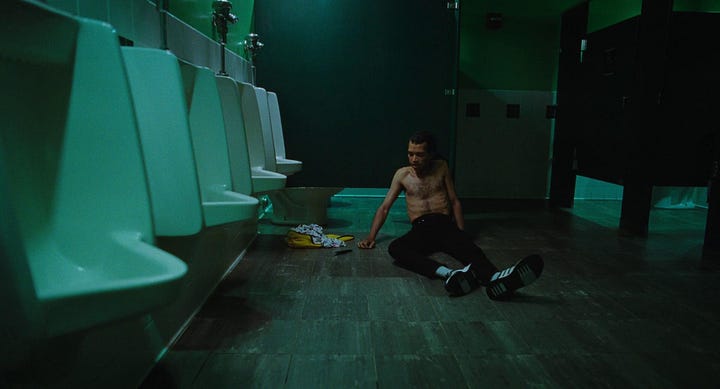

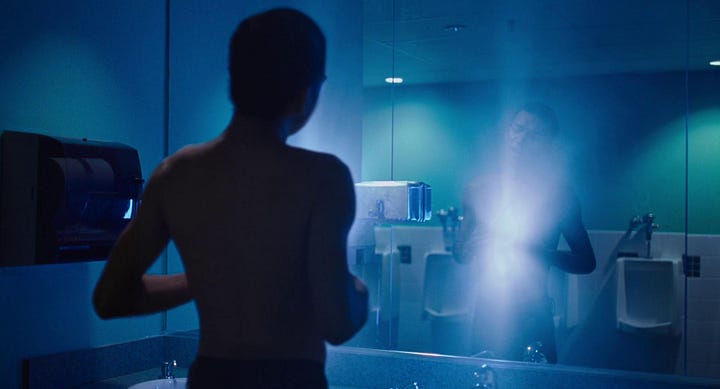
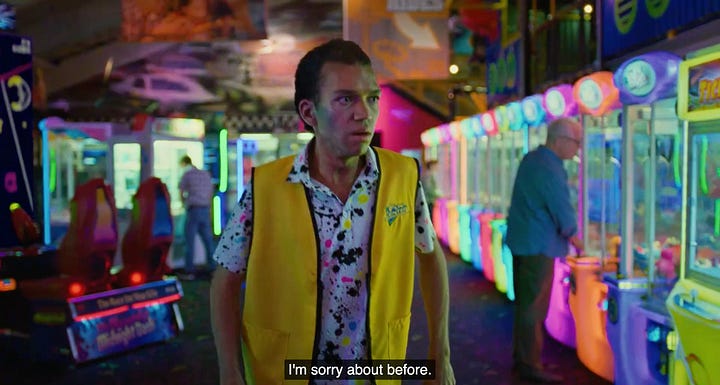
In the Fun Center bathroom, Owen sits on the floor, shirtless. A blue liquid splattered (likely Owen’s vomit) in the sink. Owen takes a box cutter and begins to slice down their chest. They walk to the mirror, and pulls their chest cavity open. Inside, we see a glowing screen, with lines from The Pink Opaque playing in a montage over a replay of Anthems For A Seventeen Year-Old Girl covered by Yuele — a call back to the intro song. Owen gets back into uniform, and walks through the Fun Center, apologizing to passerby's… “I’m sorry about before.” Still refusing to acknowledge and accept who they are inside.
This is a call back to one of the first things older Owen said to Maddy: “When I think about that stuff, it feels like someone took a shovel and dug out all of my insides. And I know there’s nothing in there, but I’m still too nervous to open myself up and check.” — Owen is literally opening themself up to see what’s inside… and they see it. They saw who they really were. And then they closed it back up.
This destroyed me. I wanted so badly for open to finally accept who they are. I thought this was the moment they wake up and save themselves in The Psychic Realm. But unfortunately, not everybody is able to do that in their lifetime. And there’s nothing more devastating than that.
And cut to credits…
In Conclusion…
I think many people will struggle to see through some of the ‘cheesy’ elements of this film (though I don’t find them cheesy). The hyper-serious tone taken while discussing villains like Mr. Melancholy and “Midnight Realms” and “Psychic Planes.” Unable to see beyond the surface level plot lines. But when you do, you will find one of the most important pieces of trans or even just queen media as a whole that I’ve ever seen. All I’ve ever wanted was to have media out there that understands my queer experience and to see myself on screen. I Saw The TV Glow made me feel seen and understood. And I cannot imagine the impact that this film had and will continue to have on viewers who are currently in their gender identity journey.
While this film will likely be most powerful for queer audiences, the overarching theme of repression is a universal one. We all repress parts of ourselves — whether it’s our gender, our sexuality, our cultural identities, or even our dreams. And I think everyone can relate to the fear of time running out before we can fully realize all of our hopes and dreams. I Saw The TV Glow is not your traditional horror film. But this film represents the darkest potential version of your life. The version where you let fear win and keep you from what you really want, as time slips away…and it slowly kills you. I’m not sure what is more horrific than that.
xoxo
JEM







